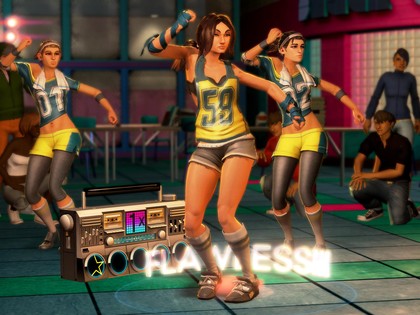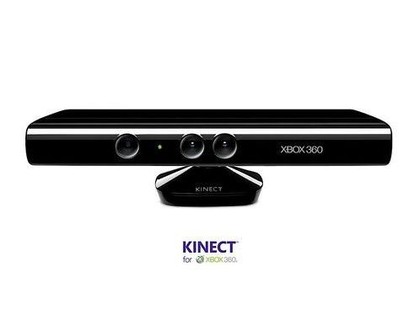Microsoft Kinect: what the future holds
We talk to the developers creating new Xbox Kinect games
Microsoft's stated core values for Kinect games are that they have to be totally intuitive, that they need to be as fun to watch as they are to play and that they need to be social.
"Core gamers actually will play this and other casual games, because 'fun is fun'… And even though some core gamers can be a bit snooty about some casual games," adds Greg Fischbach, CEO and President of Yoostar Entertainment Group, Inc (and the original founder of Acclaim Entertainment back in the late 1980s). "The gesture and speech technology being offered inside Kinect is both unique and novel. I mean, it took us a little while before iPhone gaming took off.

DANCE CENTRAL: Kinect games are not yet appealing to hardcore gamers
"So I think it will take the development and the publishing community another 18 months or so until whatever that game is that is really going to appeal to a hardcore gamer that uses gesture and speech technology arrives," adds Fischbach. "It is people like Steve and his group at Blitz that will design the new interfaces that will make Kinect exciting and interesting.
"You know, I've been making games for lots of years. And you really have to re-think how you write games for both these new systems [Kinect and PlayStation Move]. Now how are you going to write using the motion-control in such a way to make the game interesting for the hardcore gamer? For it to have that play dynamic that he or she is used to?"
Fischbach started Acclaim way back in 1987, "when when we had a joystick and a single button for input." He stresses that it is important for gamers and game creators to trace the history of gaming all the way through from that time, to "see that we just kept adding buttons, until you had a joypad that is so complex that we were holding the growth of the audience for gaming back."
Now, in terms of making games for Kinect [and PS Move] Fischbach considers these things as, "just another tool in the toolkit for developers."
Get daily insight, inspiration and deals in your inbox
Sign up for breaking news, reviews, opinion, top tech deals, and more.
No game-changing Kinect game?
Perhaps one of the reasons why the core or hardcore gaming community has been so critical of the E3 2010 games line-up for Kinect is down to the reason that Microsoft has still to announce that type of 'game-changing' Milo and Kate style title that they (secretly) hoped would draw them in.
"That's probably fair, but it is going to take the development community a while to catch up with the technology and really start to explore the possibilities," says Stopps.
While Microsoft is clearly looking to capitalise on the growth of casual and party gaming market that has exploded since the launch of the Nintendo Wii, the developer is also adamant that, "within that, there will still be those games that start to come out over the coming months that start to appeal to that hardcore gamer as well."
The bottom line is that many hardcore gamers have, as Stopps notes, "become very adept with the current controller and they like sitting down to play." They don't like the idea that they might at some point be asked to get up off the couch and start actually moving their bodies around to control an on-screen avatar.

KINECT: Camera and voice control will soon be used by devs to appeal to core gamers
"There will also be games that will be designed for a controller and suit a controller and that will be great controller games," the developer adds. "And there will always be games that are designed specifically for Kinect and Move. And then there will also be games that will swop between the two.
"As people get used to using it, you could well imagine them picking up the controller to do intricate movements with the controller. And then see them putting down the controller to do general brushstroke style movements with their hands. But it is going to take some time for the platform to mature, until developers realise what people do like doing and what they don't like doing.
"Let's not forget that what Nintendo has never forgotten, and what they have done so well, is to create fun experiences at the heart of their games."
Kinect: lessons, limitations and Minority Report
For Kinect devs such as Blitz and others, the big challenge is trying to create a whole new way to get people interfacing with technology.
As Stopps puts it: "everything that people have learned before is essentially being thrown away, and we are trying to get people to deal with controlling screens in a way in which they have never done before, they are just not used to controlling games with their bare hands.
"And sure, there are lessons to be learned from touchscreen interfaces and voice-interaction technology, but the single biggest challenge is to try to create an intuitive way of interfacing. And the biggest mistake that some developers have made early on is to think that they can just port Wii games straight into Kinect.
"That is not the same experience at all. And to do that is doing such a great dis-service to Kinect, because this technology can do so much more and is so much more powerful."
As for limitations, the Blitz developer doesn't think they have found the extent to which this technology is going to be pushed yet. "It is genuinely exciting. It is that 'Minority Report' experience.
"In terms of the limitations – for us, most of those have been in people's pre-conceptions about the technology," adds Greg Fischbach. "In Yoostar 2, in terms of where we're going to be able to take the product, in terms of technology, it will almost be a 'post production kit' for the gamer. I wouldn't necessarily say that everybody should embrace it, but it's just another great tool.
"So you might want to place virtual items into the scene, put something into your character's hands on the screen and play around with the movie. But of course the more complicated you make these things, you reach the narrow part of the pyramid, because most people won't want to do that. But the more aggressive gamers in the community will start to take their videos they've created and want to share it with their friends, they'll put it up on their Facebook site and it will start to become more of a social community.
"Just like Zynga, you're taking your user-generated content and putting it up into a social environment – and that keeps people there and draws them in."
But what about the learning curve for developers using the new Kinect tech? Has that been a painful process?
"No, it has been painless in terms of the technology," says Stopps. "It was only painful in the early days in terms of the psychological adaption to thinking in different ways of how to interact with on-screen menus and characters. But these are lessons that you can only learn from trial and error, and lots and lots of usability testing.
"Actually, if you start really using your imagination as a developer, and start forgetting what you think you should be doing and looking at what the technology allows you to deliver in terms of offering new experiences, then the possibilities are boundless."
